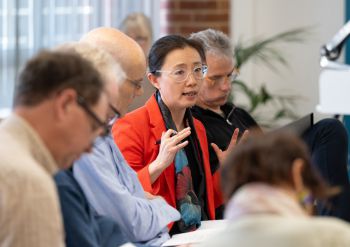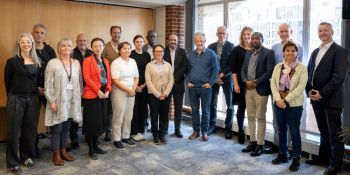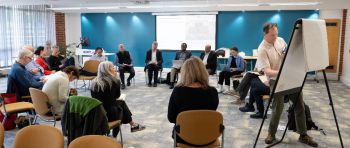Re-imagining collaboration in a turbulent world: Sussex charts new direction for Transformative Innovation Policy
Posted on behalf of: Transformative Innovation Policy Consortium
Last updated: Friday, 21 November 2025

Nannan Lundin (Vinnova) outlines priorities for TIPC's next phase

TIPC members and partners attending strategic dialogue on global system change

Attendees compile a portfolio of future policy experimentation
The University of Sussex Business School hosted two days of intensive discussions with policymakers and funders last month to identify new pathways towards global system change amid deep economic and political uncertainty.
The strategic dialogue was led by the Transformative Innovation Policy Consortium (TIPC), coordinated out of SPRU, with input from the Department of Science, Technology and Innovation, South Africa; Research Council of Norway; Vinnova, Sweden’s national innovation agency; National Secretariat of Science, Technology and Innovation, Panama; UN Development Programme; UN Environment Programme Copenhagen Climate Centre; Austrian Institute of Technology; Government of Catalonia; Utrecht University; and INGENIO (Joint Research Centre of the Spanish National Research Council and Polytechnic University of Valencia, Spain).
Reflecting on a decade of TIPC
Faced with accelerating technological change, growing geopolitical tensions and a shifting landscape for international cooperation, participants reflected on TIPC’s progress since its inception at Sussex almost 10 years ago. They also explored current challenges for policy makers seeking to drive systems transformation and considered how to chart a future direction for the alliance.
Founded in 2016, TIPC members invest in a shared programme of research, training and test-and-learn projects to accelerate change through innovation in energy, health, food, water, and other systems. With hubs in Africa, Latin America and Europe, the partnership also connects thousands of practitioners worldwide through networks, conferences, peer learning events and an online resource hub.
TIPC functions as a ‘living lab’, capturing and communicating lessons from real-world interventions across regions. With science, technology and innovation (STI) systems increasingly expected to play a central role in advancing transformative change, participants emphasised the growing need for learning exchanges between policy makers, funders and researchers.
Navigating political and economic upheaval
Participants reflected on threats to transformation posed by geopolitical tensions, security concerns and economic competition. Rising government attention on protecting domestic industries, securing supply chains and preparing for potential conflicts risks side-lining long-term goals for sustainability, justice and deep systemic change.
Members explored how TIPC’s core principles can be compatible with resilience and competitiveness, while remaining true to the long-term, systems transformation aims.
Alongside its global reach, TIPC also operates at local and civic level. Discussions on place-based approaches highlighted the role of local leadership in driving system change in the face of uncertainty and complexity. Examples included work led by the Government of Catalonia addressing complex challenges such as ageing populations through innovative policy approaches.
Developing conditions for deep collaboration
The dialogue considered how inherent power imbalances and systemic inequalities can be navigated to ensure a fair distribution of benefits across TIPC’s portfolio.
Through co-enquiry, participants explored the values and behaviours necessary to sustain equitable partnerships. Transparency, humility and reflexivity were identified as guiding principles for practitioners and researchers.
Alignment with Sussex 2035
Visitors met with Executive Dean Ingrid Woolard and other members of the Business School leadership team to learn about the aims and priorities for Sussex 2035, identifying points of convergence between the University’s strategic goals and TIPC’s mission.
‘TIPC is a unique platform for engaged, real-world inquiry, and its mission aligns with the core pillars of our new University strategy — from deepening international engagement and delivering societal impact, to encouraging experimentation and facilitating fair and equitable collaboration,’ the Executive Dean noted.
‘As we look ahead, we are eager to work with members and partners to imagine what we could achieve together in a third phase.’
Shaping the next phase of collaboration
The dialogue served as the starting point for co-creating a fresh agenda for TIPC. Further consultation with TIPC’s Governing Board and other STI agencies will follow before proposals for new thematic priorities and working programmes are drawn up.
‘This was an important step towards conceptualising the next phase of the partnership,’ said Victoria Shaw, TIPC’s Programme Director.
‘It underscored the deep commitment of policy members and academic partners to the unique co-creation model, and set out why the need for deep and sustained cooperation is now more urgent than ever.’
Further information: https://tipconsortium.net/news/

